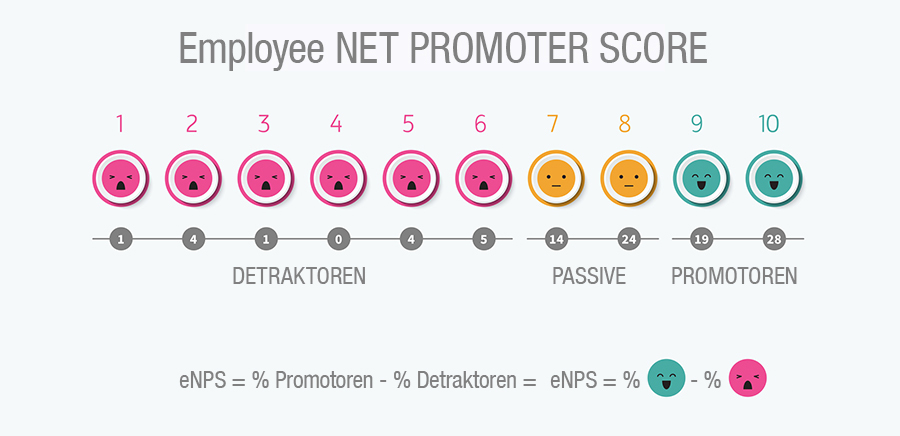What is the Employee Net Promoter Score (eNPS) and how can you use it for your business?
The Employee Net Promoter Score (eNPS) stands for "recommendation rate" or the willingness of employees to recommend the company as an employer. Often, the eNPS is used as a synonym for employee engagement, satisfaction and loyalty. The eNPS is a highly simplified but effective way to measure current employee sentiment and test the effectiveness of employee engagement and loyalty initiatives in the short term. This article explains what the eNPS is, how the calculation works, and how regular measurement can benefit your organization.

How is the eNPS calculated?
To calculate the Employee Net Promoter Score, employees are asked a single question: "On a scale of 0 to 10, how likely is it that you would recommend your company as an employer to people you know?" The answer is then assigned a numerical value based on the ranking of likelihood to recommend. This is called "scaling" or "rating" the answers given. For example: the eNPS is calculated as the percentage of employees who gave a "9" or "10" minus the percentage of employees who gave a "0" or "1". This percentage is then multiplied by -1 to get the eNPS.
What is a good eNPS value?
Anything above 0 is to be understood as a positive result: Employees would recommend you overall. The higher above 0, the better; a 100 is the best possible value. In this case, all employees would rate you with a 9 or 10. A good eNPS value is between 10 and 30. Anything above 30 is excellent.
Why you should measure the eNPS regularly
The eNPS is a popular and useful tool to measure the general sentiment of employees towards their employer. The great advantage lies in its simplicity and short survey time. A single question can also be asked once in between and takes only a few seconds. But this very simplicity is also the crux: the eNPS does not provide a complete picture and can very easily be misinterpreted or overrated.
The eNPS is unsuitable
- To measure employee retention
- To measure engagement and satisfaction
- For the assessment of employer performance
The eNPS is well suited
- to evaluate the immediate impact of initiatives and measures
- as a "pulse measurement" to track progress.
- to identify potential problems that could affect employees
What actions companies can take to increase their eNPS
Create an inclusive and collaborative culture. People feel engaged when they feel valued and part of a team. Create a culture where employees feel comfortable sharing their ideas, asking questions and showing curiosity.
Create an environment where employees can trust each other. Trust is an essential component of any healthy relationship. It allows people to support each other and feel comfortable raising concerns or asking for help when they need it.
Focus on recognition and appreciation. It can be easy to get used to a permanent employee and forget to thank them for their work.
Focus on employee retention. It is much more cost effective to retain an employee than to hire a new one.
Conclusion
The Employee Net Promoter Score is a simple but effective method for measuring the mood in the company. It provides a quick snapshot and can help to review measures at short intervals and identify problems at an early stage.



